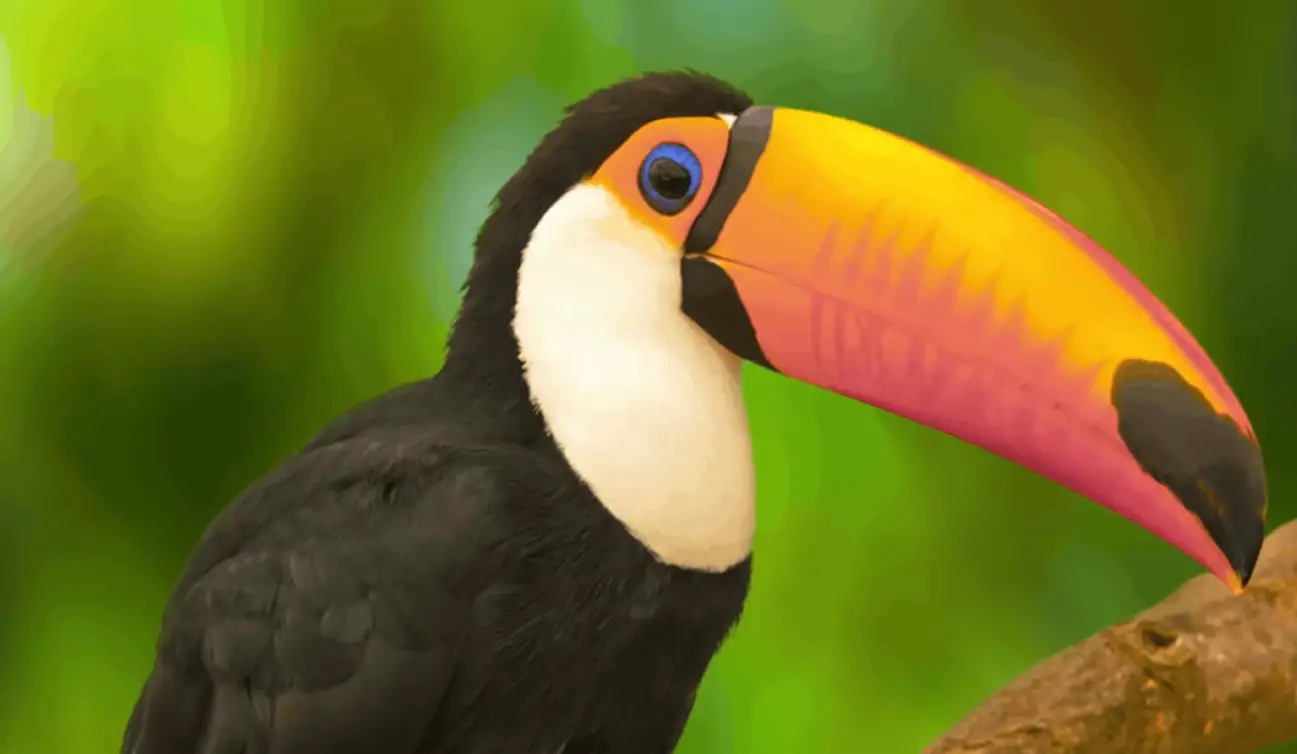Are Toucans Good Pets?
Toucans, with their vibrant beaks and tropical allure, often capture the imagination of prospective pet owners seeking a unique avian companion. The prospect of having a toucan as a pet evokes images of a tropical paradise, resonating with the idea of having an exotic and beautiful bird as a housemate.
However, like any potential pet, it’s crucial to delve beyond the initial allure and thoroughly evaluate whether toucans make good pets based on various essential aspects.
Toucans, known for their striking appearance and captivating personalities, are native to the jungles of Central and South America. Their distinctive and colorful beaks make them stand out in the avian world.
While they possess traits that can make them attractive as pets, it’s essential to consider factors such as their behavior, care requirements, and suitability for domestic living. This exploration aims to provide an in-depth analysis of various aspects related to toucan ownership, enabling prospective pet owners to make an informed decision.

By analyzing their personality types, tendencies towards biting, talking abilities, and more, we aim to provide a thorough understanding of what potential toucan owners can expect. We’ll address the specific needs and potential concerns associated with toucan care, such as their diet, social interactions, and suitability for certain living conditions.
Ultimately, this exploration intends to guide prospective toucan owners in making an informed decision based on a comprehensive understanding of the joys and responsibilities that come with having a toucan as a pet.
Related post-Toucan vs Parrot: Which Feathered Friend Would You Choose as a Beginner?
Personality of Toucans: Colorful Characters of the Avian World
Toucans, with their vibrant plumage and distinctively large, colorful bills, possess a personality as captivating as their appearance. These tropical birds, native to the forests of Central and South America, are known for their playful, curious, and social nature. It is crucial for potential owners to understanding their personality to ensure a compatible match between the bird’s traits and the expectations of a household companion.
Social and Interactive Nature
Toucans are highly social birds that thrive on interaction and companionship. They enjoy being around their human caregivers and other birds, making them great additions to multi-bird households. Their love for interaction often extends to playful behavior and entertaining antics, bringing liveliness to the home.
Curious and Inquisitive
Toucans exhibit a natural curiosity about their surroundings. They enjoy exploring their environment, investigating new toys, and engaging with novel experiences. This inquisitive nature encourages mental stimulation, making puzzle feeders and interactive toys particularly appealing to them.
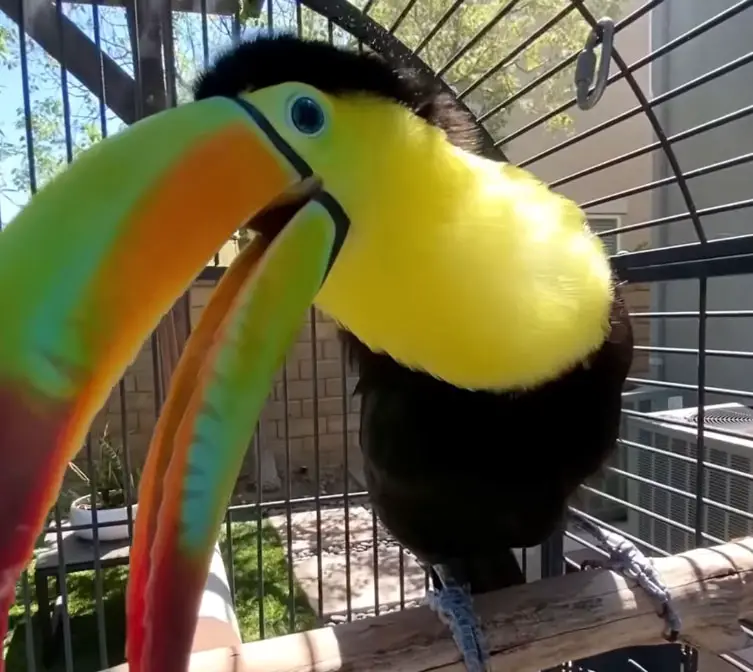
Playful and Active
Toucans are inherently playful birds, often showcasing their energetic side. They enjoy hopping, climbing, and engaging in aerial displays within their living spaces. Providing ample opportunities for physical activity and mental engagement is essential for their well-being.
Gentle and Docile
While toucans possess a playful disposition, they are generally gentle and tolerant birds. They seldom exhibit aggressive behavior, making them suitable for families with a considerate and gentle approach to pet care.
Bonding and Affectionate
Toucans have the capacity to form strong bonds with their human companions. They often enjoy cuddling and being gently petted, showcasing affection and trust. However, it’s important to remember that each toucan has its own preferences and comfort levels regarding physical interaction.
Expressive Communication
Toucans have a range of expressive behaviors that allow them to convey their feelings and needs. From playful hopping to head-bobbing, they communicate joy and excitement. Understanding these cues helps in fostering a strong bond and ensuring the bird’s well-being.
Intelligent and Problem-Solvers
Toucans are intelligent birds that demonstrate problem-solving abilities. They can quickly adapt to new challenges and learn from their experiences, making them receptive to training and mental enrichment activities.
Understanding the personality of toucans is essential for providing them with an enriching and stimulating environment. Their lively and affectionate nature makes them delightful companions for those willing to invest time and effort into their care and well-being. A happy toucan is a playful and interactive one, eager to share its vibrant world with its human family.
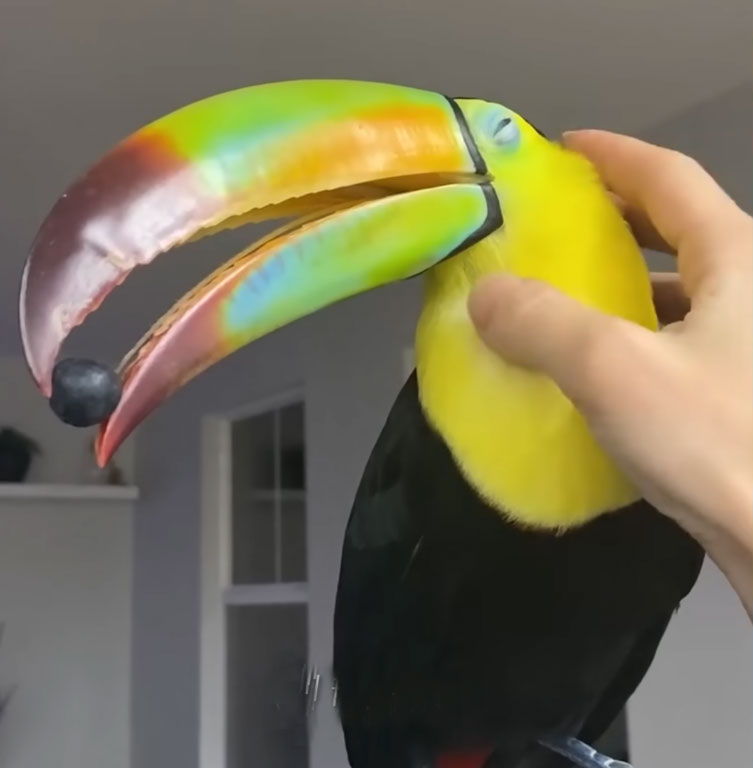
Biting Issue
Biting is a common concern among potential bird owners, including those considering toucans as pets. Toucans, like many birds, may resort to biting for various reasons. It’s important to comprehend the underlying causes and work towards minimizing or preventing biting behavior, ensuring a harmonious relationship between the toucan and its caregivers.
Causes of Biting
Fear or Anxiety
Toucans, especially if they have not been adequately socialized, may bite when they feel threatened, scared, or anxious. New environments, sudden loud noises, or unfamiliar people can trigger this response.
Protecting Territory
Toucans, being territorial, might bite when they feel their cage or their immediate area is being invaded. This territorial instinct is a natural behavior and a form of self-defense.
Mating Season Aggression
During their breeding season, toucans may display increased aggression, including biting, especially if they feel threatened or if they are protecting their mate or nesting area.
Pain or Discomfort
Physical discomfort, illness, or pain can cause a normally gentle toucan to bite. It’s their way of expressing distress or trying to alleviate discomfort.
Communication
Toucans communicate using their beaks, and sometimes what might seem like a bite is actually an attempt to communicate or get attention.
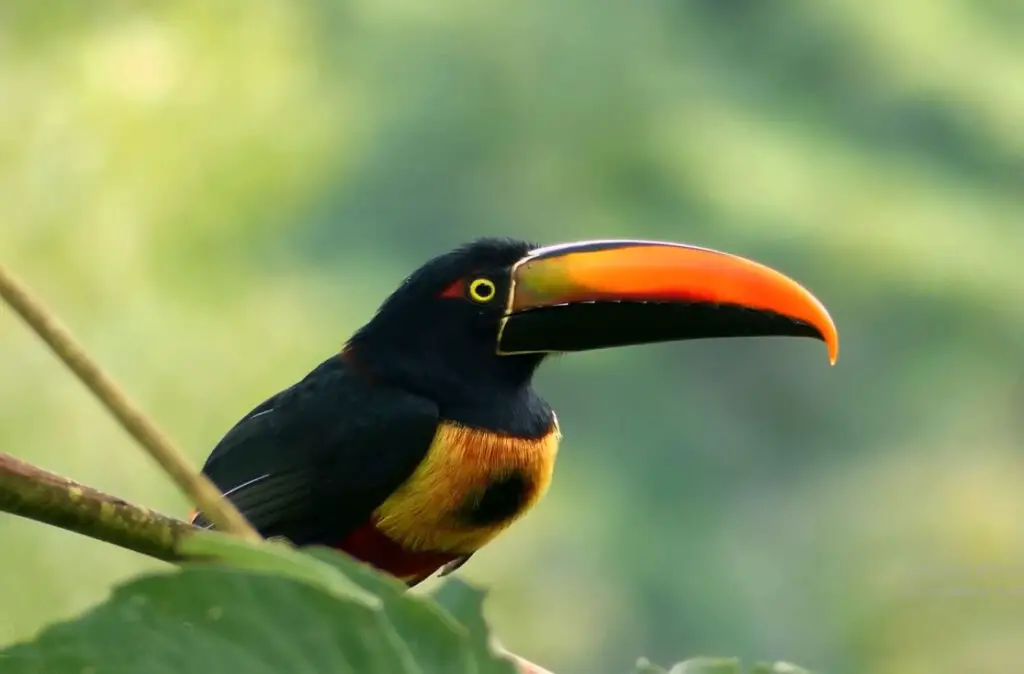
Dealing with Biting
Gentle Approach
Adopt a calm and gentle approach when handling toucans, especially if they seem anxious or fearful. Sudden movements or loud noises can startle them and may lead to defensive biting.
Socialization
Early and positive socialization with the toucan is crucial to minimize fear-based biting. Gradually expose the toucan to various people, environments, and experiences to help them become more comfortable and less likely to bite out of fear.
Training and Positive Reinforcement
Train the toucan using positive reinforcement techniques. Reward desired behaviors with treats, praise, or toys. This positive association helps in reducing biting tendencies.
Understanding Triggers
Pay attention to the toucan’s body language and behavior to identify triggers for biting. Avoid or manage situations that provoke fear, anxiety, or aggression.
Provide Adequate Space
Ensure the toucan has enough space and a suitable environment to prevent frustration that may lead to biting due to feeling confined or stressed.
Seeking Professional Guidance
If biting becomes a persistent issue or if it’s related to aggression or territorial behavior, consulting a veterinarian or a professional bird trainer is advisable. They can offer specific strategies to address and manage the biting concern effectively.
Biting, although challenging, can be managed and reduced through patience, understanding, and appropriate training. By addressing the underlying causes and employing positive reinforcement techniques, caregivers can foster a trusting and gentle relationship with their toucans, minimizing instances of biting and promoting a happy and harmonious environment for both the toucan and its human companions.
Talking Ability of Toucans
Toucans, renowned for their distinctive and colorful appearance, are not typically known for their talking abilities like some other parrot species.
Toucans often produce whistles, clicks, and other unique sounds. These can vary in pitch, tone, and volume, allowing them to communicate different emotions or intentions, akin to a subtle form of language.
It’s important to manage expectations regarding talking ability. Toucans have physical limitations due to the structure of their syrinx, the avian vocal organ. This restricts them from reproducing complex speech sounds.
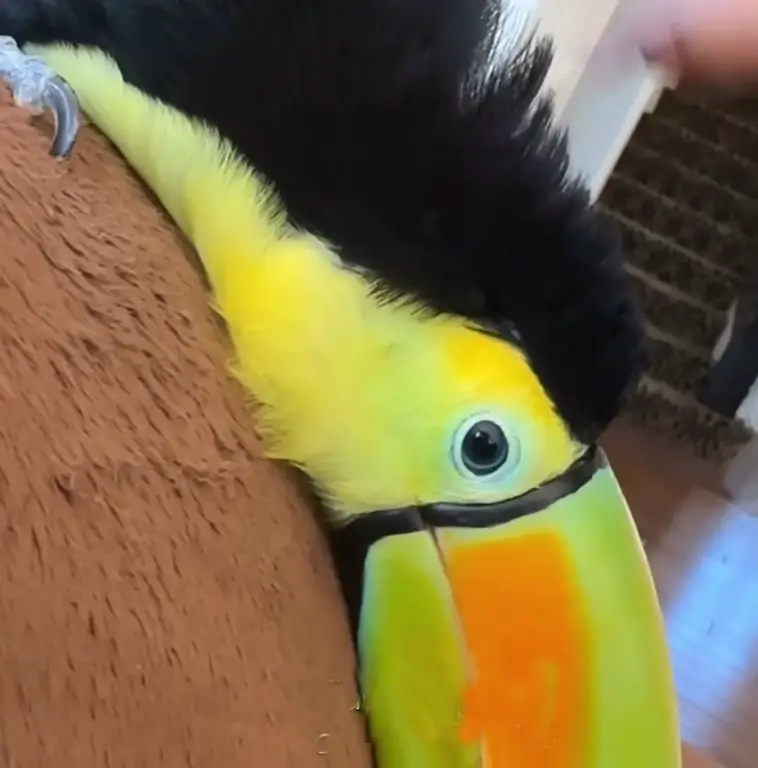
Housing Toucans Around Children: Creating a Safe and Harmonious Environment
The decision to house toucans, or any pet, around children involves careful consideration of both the bird’s well-being and the safety of the children. Toucans, with their vibrant appearance and playful nature, can be fascinating for children. However, it’s crucial to establish a living environment that ensures the safety and comfort of both the bird and the children.
Toucan Characteristics and Child Safety
Beak and Biting Concerns
Toucans have large, sturdy beaks which, though not designed for aggression, can cause injury if mishandled. Educating children about gentle interaction and supervised handling is essential to prevent accidents.
Physical Interaction
Children should be taught to avoid rough play or handling that could stress or frighten the toucan. Teaching them to respect the toucan’s personal space promotes a safe and respectful environment.
Supervision and Monitoring
Adult supervision during interactions between children and the toucan is imperative. Ensuring that responsible adults are present can prevent accidental harm to either party.
Secure Cage Placement
Position the toucan’s cage in an area where children cannot accidentally knock it over or reach inside. Elevated or wall-mounted cages are good options to ensure the bird’s safety.
Child-Proofing the Environment
Make sure the area around the toucan’s cage is child-proofed to prevent access to hazardous items or the cage itself. This includes securing wires, removing choking hazards, and ensuring the toucan is not in reach of any potential dangers.
Educational Boundaries
Educate children about designated toucan-free zones and the importance of giving the bird its own space. Creating clear boundaries helps establish respect and understanding.
Learning and Observation
Toucans offer an educational experience for children to learn about nature, behavior, and responsibility. Encourage children to observe the toucan’s natural behaviors and habits.
Supervised Feeding
Involve children in supervised feeding routines. This not only fosters a sense of responsibility but also teaches them about appropriate nutrition for the toucan.
Hand Washing
Teach children to wash their hands before and after interacting with the toucan, promoting hygiene and preventing the spread of potential infections.
Cage Cleaning Awareness
Make children aware of the importance of maintaining a clean living space for the toucan. Supervised involvement in simple cage-cleaning tasks instills a sense of responsibility.
Housing toucans around children can be a delightful experience when safety and mutual respect are prioritized. Proper education, supervision, and creating a secure environment are key aspects of promoting a harmonious coexistence between toucans and the younger members of the household. Through guided interaction and responsible care, children can appreciate the beauty of toucans while ensuring the welfare of these captivating birds.
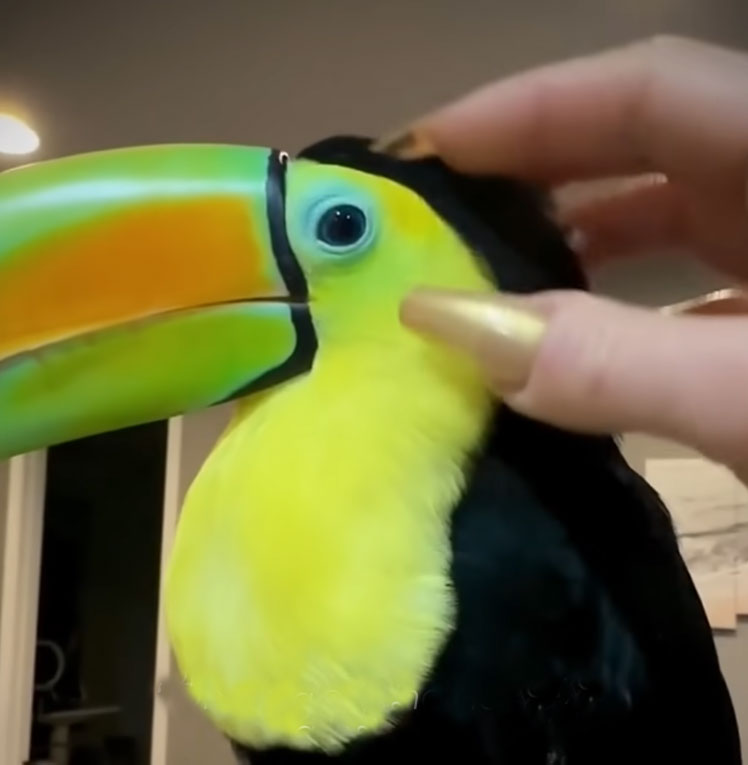
Screaming/Noise Level/Loudness: Understanding Toucan Vocalization
Toucans, like many birds, are known for their vocal expressions, which can range from soft coos to louder calls. Understanding their vocalizations, the reasons behind them, and how to manage the noise level is crucial for both toucan owners and those living in close proximity.
Morning and Evening Calls
Toucans often vocalize more during the morning and evening, as it is a part of their natural routine. These calls can be relatively loud but are usually brief.
Contact Calls
Toucans use calls to communicate with other birds, especially within a group. These contact calls are vital for maintaining social connections and ensuring the safety and coordination of the flock.
Excitement and Playfulness
Toucans can get excited during playtime or when engaged with toys. This excitement may lead to louder vocalizations as they express joy and enthusiasm.
Communication and Social Interaction
Toucans use their calls to communicate with each other, especially to convey emotions, intentions, or warnings within their group.
Mating and Breeding Season
During the breeding season, toucans may become more vocal, trying to attract mates or establish territory, resulting in an increase in noise level.
Responding to Environment
Changes in the environment, such as loud noises or new people, can trigger louder vocalizations in toucans as a response to perceived threats or heightened awareness.
Managing Noise Levels
Being aware of when toucans are naturally more vocal allows for better acceptance and adaptation to their noise patterns. Engage toucans in regular play and interaction to release excess energy and reduce boredom, which can, in turn, help manage excessive vocalization.
Soundproofing the toucan’s living space, especially in shared living environments like apartments, can help dampen the noise and minimize disturbance to others.
Toucans, like most birds, have their own vocal tendencies. By understanding and accommodating their natural behavior and employing appropriate training techniques, toucan owners can successfully manage noise levels and promote a peaceful and harmonious environment for both the birds and those around them.
Social Behavior of Toucans: Understanding Bonding Patterns
Toucans are inherently social birds, known for their strong sense of companionship and communication within their own flock. However, when it comes to bonding with humans, their behavior may differ from other more domesticated birds. Understanding their social tendencies is crucial for building a strong and fulfilling relationship between toucans and their human companions.
Toucans are naturally flock animals, which means they thrive in social settings and often find comfort and security in the presence of others, whether it’s fellow toucans or their human caregivers.
Social interaction is essential for their well-being. They engage in various social activities like preening, playing, and even sunning themselves, all of which reinforce their social bonds.
Toucans often exhibit monogamous behavior, forming strong and lasting bonds with a single mate. This natural inclination to form a strong bond translates to their interactions with humans as well.
Toucans may tend to form a strong bond with one particular person in the household, often the one who feeds, cares for, or interacts with them the most. This bond is built on trust, consistent interaction, and positive experiences.
Once a toucan forms a close bond with a human, they display loyalty and affection towards that individual. They seek their attention, enjoy their company, and may even show signs of distress when separated.
Adaptability to New Environment
Toucans, those vibrant and curious birds, are true masters of adaptability. They can thrive in a medley of habitats, showcasing an impressive knack for adjusting and flourishing in different settings. Understanding their ability to adapt and stay emotionally steady is crucial to providing them with the right home and ensuring their overall happiness.
Picture toucans as versatile globetrotters, capable of calling a diverse range of habitats their home, from lush tropical rainforests to wide-open savannas. Their talent for adjusting to a variety of ecosystems truly demonstrates their adaptability.
These fascinating birds are spread across the vast expanse of Central and South America, showing off their prowess at adapting to everything from different climates and altitudes to a wide array of vegetation.
Imagine toucans as newcomers in a city—they might need a little time to settle in when they move to a new environment. This period of adjustment allows them to familiarize themselves with their surroundings, the people, and the daily routines.
Emotional Stability in Toucans
Creating a consistent daily routine and providing thoughtful care helps toucans feel more at ease in their new surroundings, promoting emotional stability and reducing stress.
Toucans are social butterflies, enjoying both the company of their fellow toucans and interactions with humans. Just like us, they can feel a bit down if they don’t have companionship, highlighting the importance of social interactions.
Engaging toucans with stimulating activities like puzzles, foraging games, and toys keeps their minds active and engaged, banishing boredom and contributing to their emotional well-being.
Imagine providing toucans with a cozy nook, a place where they can feel safe and relaxed. It’s like having your own favorite spot at home; it boosts their emotional stability and confidence.
When change is in the air for toucans, it’s best served gradually. Rapid alterations can stress them out, so a slow and gentle transition is the way to go.
Introducing new friends or caregivers to toucans should be a gentle process, allowing the toucans to become familiar with the new faces and adjust emotionally.
Stress isn’t good for anyone, including toucans. Creating a calm environment and maintaining consistent care are essential to minimizing stress and keeping our toucan friends emotionally sound and healthy.
Regular check-ups with the vet are akin to our doctor visits, ensuring that any health concerns affecting the emotional well-being of toucans are promptly identified and addressed.
Toucans, with their vibrant personalities and remarkable adaptability, truly remind us of the beauty of diversity and the importance of finding a sense of belonging wherever we go.
Cuddly Nature and Interaction Preferences of Toucans
Toucans, known for their vibrant appearance and playful behaviors, may not be traditional cuddlers like some other companion birds. However, they do exhibit specific preferences when it comes to interaction and physical contact.
Physical Interaction Preferences
Toucans often enjoy gentle head rubs and scratches, especially around the area of their cere (the soft region just above the beak). This can be a comforting and pleasant experience for them.
Some toucans may allow light belly rubs, but this largely depends on the individual bird’s comfort level. It’s essential to observe their reactions and respect their boundaries during belly rubs.
Toucans may like perching on your arm or shoulder, allowing them to be close to you and providing a sense of security. However, they typically prefer short perching durations.
Toucans might snuggle or nestle against a trusted human companion, particularly during moments of relaxation. This close contact can be a way for them to feel secure and bonded.
Toucans may nuzzle or lightly nibble at their caregiver’s fingers, hair, or clothing. This behavior is a form of bonding and is usually gentle and affectionate.
Toucans often appreciate sitting close to their human companions, even if not engaging in direct physical contact. They like observing their caregivers, and the presence of familiar individuals provides them comfort.
Respecting Boundaries
It’s crucial to observe the toucan’s body language and respect their cues for comfort or discomfort during interactions. If a toucan appears anxious or uncomfortable, it’s important to give them space.
Building trust over time through consistent, gentle interactions is key to a toucan becoming more comfortable with cuddling or close physical contact.
Rewarding toucans with treats, gentle praise, or affection when they engage in desired cuddly behaviors reinforces their trust and encourages continued positive interaction.
Each toucan is unique, and their preferences for cuddling and interaction can vary. It’s important to spend time with them, understand their individual preferences, and adapt accordingly.
While toucans may not have the same cuddly nature as some other pets, they do appreciate gentle interaction and closeness with their caregivers. Respectful, affectionate, and observant interaction is key to building a strong and loving bond with these remarkable birds.
Trainability and Intelligence of Toucans: Unveiling Their Cognitive Capacity
Toucans, with their colorful plumage and vibrant personalities, possess a level of intelligence that makes them fascinating and trainable companions. Understanding their cognitive abilities and trainability is essential for providing them with stimulating environments and fostering a deeper connection between toucans and their human caregivers.
Problem-Solving Skills
Toucans have demonstrated an ability to solve simple food puzzles, indicating their problem-solving skills. They can figure out how to extract food from various puzzle feeders, providing mental stimulation and rewards.
Some toucans have shown a basic understanding of tool usage, such as using a stick to reach or interact with objects. This showcases a level of problem-solving and adaptability.
Toucans are keen observers and can learn from watching others, whether it’s fellow toucans or their human caregivers. They can pick up behaviors, sounds, or actions by observing and mimicking.
Toucans can adapt relatively quickly to changes in their environment, routines, or the introduction of new stimuli. This adaptability highlights their capacity to learn and adjust.
Toucans often remember their feeding times and show anticipation, indicating their ability to recall specific events and routines.
They can recognize familiar faces, distinguishing between different individuals and showing a level of memory and recall.
Toucans enjoy playing with toys and engaging in interactive activities. Toys that provide mental stimulation and require some level of problem-solving keep them engaged and entertained.
Incorporating training or teaching elements into playtime can be effective. For example, teaching them to drop a ball into a container can be a playful way to enhance their learning.
Through positive reinforcement training, interactive activities, and mental stimulation, toucans can showcase their intelligence and continually learn and grow in their environment. Building a strong bond through training enhances the overall well-being and relationship between toucans and their human companions.
Aggression Toward Other Birds and Cage Aggression in Toucans
Understanding and managing aggression, whether directed towards other birds or within the confines of a cage, is essential for providing a safe and harmonious living environment for toucans. Toucans, known for their vibrant personalities, can sometimes display aggressive behavior, which requires careful observation and appropriate intervention.
Toucans can exhibit territorial aggression, especially during mating seasons or when they perceive a threat to their nesting area or territory. This can manifest as aggressive posturing, loud vocalizations, or even physical attacks.
Aggression can occur between toucans of the same species, particularly if they are not adequately socialized or if they are competing for resources like food or attention.
Introducing a new toucan into an established group can trigger aggression as toucans establish a pecking order or vie for dominance. Proper introductions and supervised interactions are crucial.
Handling Aggression Toward Other Birds
Careful observation of toucans’ interactions is vital for understanding the triggers of aggression. Identifying the root cause allows for targeted interventions.
Ensuring an ample living space and providing sufficient resources, such as food and perches, can minimize competition and reduce aggression over territorial claims.
If aggression persists, temporarily separating the birds can diffuse tension and prevent injuries. Slow reintroduction under supervision may help in resolving conflicts.
Toucans may display aggression when they feel their cage is being invaded or disturbed. This can include biting, lunging, or aggressive vocalizations.
Toucans can become possessive about their cage, especially if they see it as their territory. Any intrusion, perceived or real, may trigger an aggressive response.
It’s important to respect the toucan’s space and not invade their cage without a valid reason. Teaching this boundary helps reduce aggressive reactions.
Associating positive experiences with approaching the cage, such as providing treats or favorite toys, can help reduce fear and aggression associated with intrusion.
Providing ample out-of-cage time for interaction and play can help reduce possessiveness over the cage and minimize aggression.
Managing aggression in toucans involves a combination of understanding their natural behaviors, proper training, and creating an environment that reduces triggers for aggression. By addressing territorial concerns, providing ample resources, and implementing positive reinforcement, caregivers can cultivate a more peaceful and harmonious atmosphere for toucans, both within their living space and during interactions with other birds.
Food Habit and Specific Food Requirements for Toucans
Understanding the dietary needs and specific food requirements of toucans is crucial for ensuring their health, vitality, and overall well-being. Toucans are frugivorous birds, primarily consuming fruits, but they also have dietary requirements that include a variety of other foods to meet their nutritional needs.
Toucans predominantly feed on a variety of fruits in their natural habitat. They have a particular affinity for soft and pulpy fruits like papaya, banana, berries, figs, and melons.
Insects and small animals, such as lizards and eggs, supplement their diet with essential proteins and nutrients. Toucans may also consume insects accidentally while feeding on fruits.
Toucans occasionally feed on flowers and nectar, adding diversity to their diet and providing additional sources of natural sugars.
Keep in mind that they are susceptible to iron storage disease. So iron rich foods should be avoided.
Special Care Requirements for Toucans
Toucans, with their distinctive beaks and vibrant plumage, are captivating birds that require special care to ensure their health, happiness, and overall well-being. Proper care involves understanding their unique needs, providing appropriate living conditions, and maintaining a nurturing environment.
Beak Health
Toucans have large, specialized beaks that require specific care. Regularly inspect and clean their beaks to prevent food debris or bacterial buildup. Providing hard and chewable toys can help keep their beaks naturally trimmed and healthy.
Hygiene and Cleanliness
Maintain a clean living environment for toucans to prevent illnesses and infections. Regularly clean their cage, perches, dishes, and toys. Provide fresh water daily and ensure good ventilation to prevent mold or bacterial growth.
Dust Sensitivity
Some toucans can be sensitive to dust and other airborne particles. Keep their living area free of dust and provide proper ventilation. Regularly clean and dust their surroundings to minimize respiratory issues.
Temperature and Humidity
Toucans thrive in moderate temperatures and high humidity, resembling their natural tropical habitats. Ensure the temperature is between 65-80°F (18-27°C), and humidity levels are around 60-70%. Use a hygrometer to monitor humidity levels accurately.
Preventing Stress
Toucans can be sensitive to changes and stressful environments. Minimize stress by maintaining a consistent daily routine, providing a secure living space, and avoiding sudden changes in their surroundings.
Social Interaction
Toucans are social birds and require regular interaction. Spend time engaging with them through play, talking, and gentle handling. Social interaction is crucial for their mental stimulation and overall well-being.
Handling with Care
When handling toucans, be gentle and cautious, especially around their beak and feet. Avoid excessive pressure on their delicate beaks, as it can cause injury.
Dietary Considerations
Pay careful attention to their diet, providing a variety of fresh fruits, vegetables, protein, and fortified pellets. Avoid foods toxic to birds and consult a vet for a specific diet plan.
Preventing Loneliness
Toucans can experience loneliness if left alone for extended periods. If possible, consider having more than one toucan to provide companionship. If a single toucan, spend quality time with them to prevent loneliness.
Safety Measures
Ensure their living space is safe and free of hazards. Toucans are curious and may chew on items that could harm them. Remove any toxic plants, secure windows and doors, and keep harmful items out of reach.
By addressing these special care requirements, toucan caregivers can ensure a safe and enriching environment that caters to their unique needs. Regular attention to their health, hygiene, socialization, and nutrition enhances their quality of life and strengthens the bond between toucans and their human companions.
Final Verdict
Owning a toucan can be a rewarding experience, offering the chance to care for a unique and captivating bird species known for its vibrant appearance and playful demeanor. However, it’s important to approach toucan ownership with careful consideration and understanding of the associated responsibilities and costs.
Toucans have specific dietary, social, and environmental needs that require dedicated attention and financial commitment. Their diet primarily consists of fresh fruits, vegetables, and occasional protein sources, necessitating regular access to a variety of produce. Moreover, maintaining a clean and enriching living space, regular veterinary check-ups, and appropriate cage accessories are vital aspects of responsible toucan ownership.
Financially, prospective toucan owners should budget for initial setup costs, recurring expenses like food and veterinary care, and potential unexpected costs, including medical emergencies. Additionally, considerations such as permits, licenses, and pet insurance should be factored into the overall budget.
So, while toucans offer a unique and charming companion experience, it’s essential for potential owners to weigh the financial, time, and care commitments carefully. Responsible toucan ownership involves proper planning, budgeting, and ongoing dedication to provide a safe, enriching, and loving environment for these remarkable birds.
